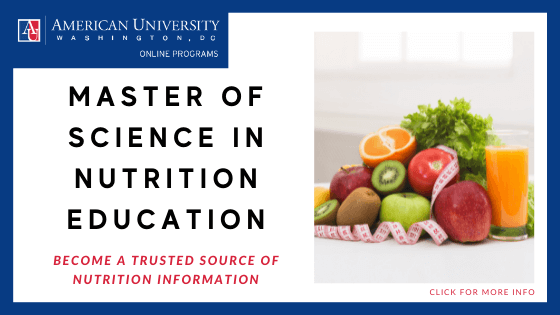Getting a master’s degree in nutrition is the next step for many college graduates and current dieticians looking to advance their careers. However, many working professionals simply do not have the time to take a full course load at their local university! That being said, many people these days wonder: “Can I get a master’s in nutrition online?”
There are many colleges that offer online master’s degrees in nutrition. The best options include:
When you get your degree online, you’ll be well-prepared for career advancement in a variety of areas.
Keep reading to learn more about the benefits of getting your master’s degree in the nutritional sciences, as well as some of the schools that offer the best nutrition programs!
Article Contents
Is It Possible to Get a Master’s Degree Online in Nutrition?
Getting your master’s degree online is becoming an increasingly popular way for people to continue their education. Both aspiring and established nutritionists and dieticians can significantly benefit from acquiring a continuing education degree online, especially these days when an advanced degree is becoming more and more valuable in this area of study.
An online program offers more flexibility for most students, especially those who have a professional career or family obligations they need to take care of. Although online education problems have gotten a bit of a bad reputation in the past, modern online programs typically follow the same curriculum as brick-and-mortar schools and prepare students for whatever career in nutrition they’re looking to have.
Requirements for Admission to Online Master’s Programs
While the specific requirements will vary based on the school you choose, most online master’s programs for nutrition will require somewhere between 30-36 credits and about two and a half years of study. Some programs may require that you complete prerequisite work in certain fields prior to program admission, such as chemistry and human anatomy/physiology.
Applicants may also need to take the Graduate Record Examination, or GRE, and submit their scores to schools they apply to. While you are always required to have a bachelor’s degree before admission into a graduate program, most schools don’t require this degree to be in the specific field of nutritional sciences.
What’s the Best Online Nutrition Master’s Program?
There are several schools, all across the country, that offer master’s programs in nutrition. The right school for each person depends on many factors, but a few universities offer programs well worth looking into. Below, we’ll discuss three of the best schools at which you can get your master’s in nutrition online!
The Top 3 Online Nutrition Master’s Programs
With the power of the internet, you can now get your master’s degree at any school you choose, anywhere across the country, no matter where you are actually located! Many schools offer online master’s programs in nutrition, but these three are some of the best, according to experts.
1. Texas Tech University: Master of Science in Nutritional Studies
Texas Tech University is a school located in Lubbock, TX that offers a Master of Science degree program in the area of Nutritional Studies. Once admitted to the program, students can choose between three distinct areas of concentration:
- Nutrition and Healthy Weight
- Nutrition and Sports
- Nutrition in the Life Cycle
Throughout the program, students will take classes including Biostatistics in Nutrition and Nutrition Research and have the opportunity to experience clinical research firsthand. Students can also participate in multidisciplinary research, which combines the nutritional sciences with science-related disciplines like biology, psychology, and public policy.
In addition to their core classes, students will take elective courses such as Food Security and Diabetes and Nutrition Management. Writing a graduate thesis can be challenging, especially for online students, so you may be pleased to hear that there is no thesis required to graduate from Texas Tech with a master’s degree in Nutritional Sciences.
The Admissions Board at Texas Tech recommends that potential applicants have at least a 3.0 undergraduate GPA, but they’ve waived the GRE requirement through the year 2021. Upon gaining admission, students will need to complete 33 credit hours throughout an average of four semesters. After graduation, students will qualify for advanced positions in many industries, including food service and nursing facilities.
2. American University: Master of Science in Nutrition Education
American University is a college based in the nation’s capital city, Washington, DC. They offer an excellent online master’s program in Nutrition Education that focuses on inspiring positive change through healthy eating.
Required courses in this program include:
- Life Cycle Nutrition
- Health Communication
- Nutrition Program Design
Students will also be required to choose two elective courses, with choices including:
- Health in the School Environment
- Sports Nutrition
- Strategies in Weight Control.
While enrolled in the program, students can attend networking events and webinars related to their field of study to gain professional experience and connections.
Halfway through the 20-month program, students will be assigned a Faculty Mentor, who will assist them with developing their resume, searching for a job after graduation, and making connections within the industry! There are plenty of online nutrition jobs to go around, it’s just a matter of find the right one. Each mentor is assigned based on the student’s specific location, as well as their career interests.
Students will have to complete 30 course credits in order to graduate with their Master’s in Nutrition Education from American University. To gain admission, the university recommends that applicants have a 3.0 undergraduate GPA. They do not require GRE scores at this time, and online scholarships are available to students who meet the eligibility requirements!
3. North Carolina State University: Master of Science in Nutrition
North Carolina State University is a school located in the capital city of Raleigh, NC. Their Master of Science in Nutrition program offers two emphases for students to choose from: Human Nutrition and Feed Science, or Animal Nutrition. The required coursework, of course, centers mainly around nutrition. However, classes in other related sciences are also a requirement. The specific sciences required depend on the student’s area of emphasis.
This is an interdepartmental program and includes classes in the following departments:
- Animal Science
- Poultry Science
- Horticulture Science
- Agriculture and Human Studies
- Molecular and Structural Biochemistry
- Food, Bioprocessing, and Nutrition Sciences
- The College of Veterinary Medicine
After completing this online, non-thesis master’s program, graduates will have a professional knowledge of the nutrition sciences and all the skills required to work in the nutrition and non-profit sectors. To graduate, students must obtain a total of 36 credit hours, with six dedicated to a practicum, internship, or approved and relevant individual project.
Students typically complete the nutrition program after four semesters. To be considered for admission, students must possess a bachelor’s degree in a science-related area, with past coursework experience in both biology and organic chemistry. A minimum 3.0 undergraduate GPA is required, as well as GRE scores at or above the 30th percentile.
Career Outlook for Nutritionists
According to the Bureau of Labor Statistics, employment in the nutrition industry is expected to grow 8% over the next ten years, much faster than what is expected for all other industries! This is due to a variety of factors, including a nationwide increase in interest in healthy eating and an aging Baby Boomer population.
Additionally, over one-third of adults in the United States are considered obese. Obesity is linked to many severe and deadly diseases, including diabetes and heart disease. Many of these individuals are part of the Baby Boomer generation, and much of the increased interest in nutrition comes from aging people looking for ways to stay healthy in their golden years.
The most common occupations for those who possess a master’s degree in nutrition are nutritionists and dieticians. Those working in this industry help people achieve healthier lifestyles through their dietary habits and may also assist people in losing weight or achieving other health goals.
These professionals assess each of their client’s health needs, then provide them with all the information and resources necessary to understand the changes they must make. Once everyone is on the same page about what must happen, the online nutritionist can develop a plan and meet with clients regularly to monitor their progress.
In addition to working with clients on a personal basis, nutritionists and dieticians may also engage with the community to speak about nutrition, healthy eating habits, or disease prevention. In certain industries, they may also contribute to scientific research related to their field.
Related Career Opportunities
While most people with master’s degrees in the nutritional sciences go on to work as either nutritionists or dieticians, there are a few other careers that these individuals commonly consider. They may work as health educators in various industries or choose a career in an academic setting.
Health Education
Health educators work within the community to promote wellness through healthy behaviors and eating habits. These educators may have a career in a variety of industries, including:
- Non-profit
- Health care
- Private business
Through their work, health educators strive to enlighten the public on a variety of topics related to health, including healthy eating. They may also help people to better access health care services or act as health care advocates.
Primary, Secondary, and Post-Secondary Teaching
Some people who obtain their master’s degree in the nutritional sciences are interested in childhood or adolescent health. If this sounds like you, you might want to consider a career in the education sector!
Individuals working in primary or secondary schools will typically work as health teachers or on-site nutritionists who oversee school cafeteria menus. If a person is working as a health teacher, they will likely be tasked with creating lesson plans based around exercise and healthy eating and educating their students on the importance of nutrition.
Suppose they’re teaching at the post-secondary, or college, level. In that case, these educators may conduct independent research or publish scholarly research for their institution, in addition to developing course outlines for both in-person and online programs. They may also collaborate with other faculty members to develop academic programs or make changes in the curriculum.
Outro
Obtaining a master’s degree in the nutritional sciences is one of the best ways to gain an additional understanding of healthy eating habits or advance your position in your current career. Before you get your master’s, you’ll need to go through a basic online nutrition degree program. Getting a degree online has never been easier, especially in a graduate setting! Make sure to consider all of your options and choose the school that best fits your needs and your goals. The is no shortage of these programs out there, but the three above are for sure the best.







